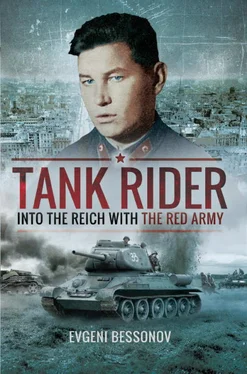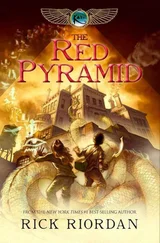Anything could happen at the front. One day those of us on the three tanks travelled too far during the night and they ordered us by radio to stop and wait for the main body of the Brigade. Some soldiers went to look for food in the village and they found some. I had excellent men, they could find anything anywhere! They brought two or three containers of milk and white bread that was still warm. We had not seen white bread and milk for a long time, and had an enjoyable meal. We were sitting in the house, enjoying the warmth. All of a sudden the door opened and a Senior Lieutenant walked in. I looked at him and saw something familiar in his face. The guy was smiling with a broad smile and asked us: ‘You have something to eat, Slavs? I said: ‘Sit down, Muscovite, but we have nothing except bread and milk.’ He replied: ‘How do you know that I am from Moscow?’ I did not want to tease him and answered that he was a teacher of craftsmanship in the 1st Soviet School, which was later renamed in the 341st school, and used to be the school’s Komsorg . I studied in that school from 1931. He said that everything was right and we even recalled common acquaintances. Everyone was amazed. Could it really happen that, so far from Moscow, two men who knew each other met in the fourth year of the war. Such things also happen generally in life, not just in war. And again we could not stay there for long – we had to move forward, only forward.
In the night of 24 January we attacked the town of Kratoshin straight off from the march. We travelled through the town quickly, and there was no serious opposition from the Germans; they just fired on us at several places. They were afraid to face our tanks with tank riders. In Poland we would often travel through small settlements quickly, without dismounting tanks, firing from the tanks and throwing the enemy out of our way. On 25 January we captured the town of Gernstadt in a battle.
It was good that the enemy’s air force was not there, and we could march both during day and night. As a rule, during the night we would stop once for two or three hours. We tried to get into houses, into a warm place. There were almost no stops during the day, and even if we had them, breaks were short, no more than one hour. It was rare that we stopped for a long time to warm the soldiers. We only had food twice a day – morning and evening; if the kitchen was there, the food was hot. Thus, in order not to be hungry during the day, we made do with trophies – mostly German tinned meat and hard tack. Sometimes we saw small loaves of black bread in plastic; the bread was not too hard, but it was tasteless. We did not really like it, but we ate it anyway. Our Russian bread would also freeze in our back-packs in the frost, if you did not eat it on time.
We stayed in a large village almost the whole night. Our company was housed in the former village school. According to practice, we appointed guards and dropped to the floor. I was not even hungry, like most other soldiers – we were almost dead from exhaustion. In the morning, after breakfast (our field kitchen was still with us) we walked up to the tanks to mount them, and I saw a carcass of a pig on our tank. I asked Savkin: ‘What is this, are you looting the civilians?’ He swore by God that it was not our pig, but the tankers’. To hell with that pig, I thought, if the tankers took it. There were no owners anyway.
Almost all day long we moved on without a battle. Although we were in the German rear, there were no German troops, and we did not hear a single shot during the day. Such days were rare and we were happy, especially given the fact that the enemy’s air force was not there either. We had suffered losses in previous battles from the German air force, and although the losses were insignificant, the air force had delayed our advance. Finally we stopped, and parked our tanks by the walls of houses so that they would look like parts of huts and would not be so visible from the air. A tank crew officer walked up to me and said: ‘Bessonov, the spirit is mine, the pig is yours!’ And he pointed at the water tank that was filled with spirit. I answered: ‘Isn’t it your pig, as Savkin told me?’ The tanker replied: ‘Don’t be angry with the men. They know you and they know that you would not allow this, so they said that the pig belonged to us.’
What could I do? I could not carry the pig 70 kilometres back! I called Savkin and shook my fist at him. He just said: ‘I’m sorry!’ Anyway, we were all hungry. ‘Well,’ I said, ‘Fry the pig, and do it fast, the order to move on can come any time.’ To be short, we fried a lot of pork on a stove in a house (the owners were not there). We ate all we could eat and fed the battalion commander with his staff, as well as the tank crews. We finished the pig and fed everyone that walked up to us. My soldier Shamrai cooked the food – he was a partisan from the Lvov area and a cook in civilian life. It is a pity that he was killed in Potsdam. At that moment a ‘mount the tanks’ order came, and we again moved ahead at high speed.
There were cases when I slept so well during the night that I did not even wake up during the small night clashes with the Germans that occurred in some villages. The soldiers sympathized with me and did not wake me up; the squad leaders could manage by themselves – if necessary, they fired on the move. During the day we sometimes ran into horse-drawn supply columns. All the personnel and their escorts were dressed in German uniforms. Among them there were all nationalities except for the Russians – Kalmyks, Uzbeks, Tatars, Kazakhs, people from the Caucasus and Poles. Apparently, the Germans did not trust the Russians and did not allow them to serve in supply units. We had different attitudes towards those men, but we did not show cruelty, did not abuse them and did not execute them. I think once we fought a supply column of Kalmyks and soldiers of other nationalities, as they tried to resist – they lost their heads and opened fire on us, and my soldiers did not like it. War is war. I never saw Russians or Ukrainians in supply columns, but met Vlasov’s men in battle many times. They always put up stubborn resistance and besides that shouted all kinds of offensive curses at us. They knew that there would be no mercy, and we did not give it – we never took them prisoners. Besides, they never surrendered, unlike the Germans.
Sometimes tanks broke down and had to stop for small repairs. In such cases the tank riders would as a rule stay with the tank. But if a tank needed more serious repair, the tank riders would travel along on another tank. One of our tanks broke down, and Sergeant Nikolai Savkin with his squad stayed in that village. Retreating Fritzes entered the village after we left and burnt the tank in battle. Savkin himself was killed, along with his men, among them Bespalyuk, Polischuk and others… That’s how it was, there were no major engagements, but platoons had fewer and fewer soldiers left…
We went through the whole of Poland fighting constantly. Sometimes the enemy put up stubborn resistance, while sometimes our arrival in a city or a village was totally unexpected for the Germans. One village still had electric lights and even a policeman on a street crossing when we drove in. At first he did not understand which tanks these were, but as soon as we drove closer, he realized who we were and ran away from his post, he was off like a flash. I have already mentioned that Germans run very fast.
I also remember the following incident. We stopped after a march at a detached house, and the soldiers decided to go into one of them to get warm. It was dark and quiet in the house. As soon as some five men walked into the house, several shots sounded in the air. The soldiers ran out of the house, one of them was lightly wounded, there was blood all over his face. I was standing at the house next to a tank, and my soldiers reported to me what had happened. I ordered them to toss hand-grenades through the windows, but then we changed our mind – we might also kill our own soldiers. We rushed into the house and opened fire with submachine-guns and illuminated it with flashlights. We found two men and a woman in the house: they were Poles, and we asked them who had fired. They answered that those were Schwabs, i.e., Germans, and pointed at the attic. We found two Germans there, they had both been killed in the exchange of fire. The Poles informed us that one of them was Lieutenant Colonel and the second was a Captain. The Lieutenant Colonel was the city’s commandant, while the Captain was his deputy. The Poles told me that they were afraid to warn us, as the Germans threatened to execute them. The soldiers stayed in the house, while I went away and left them alone, especially as a ‘mount the tanks’ order came and we again moved on forward to the west.
Читать дальше












